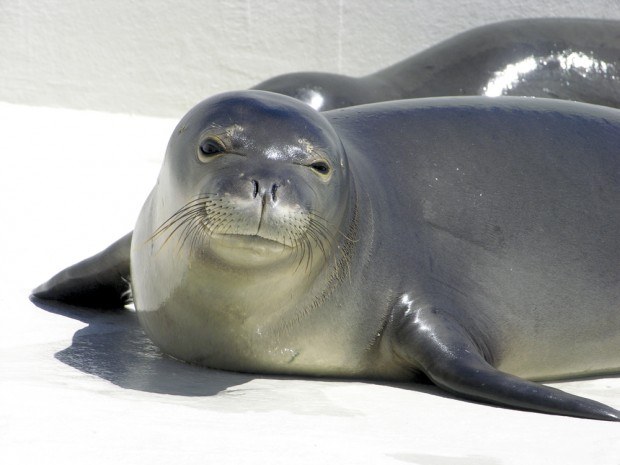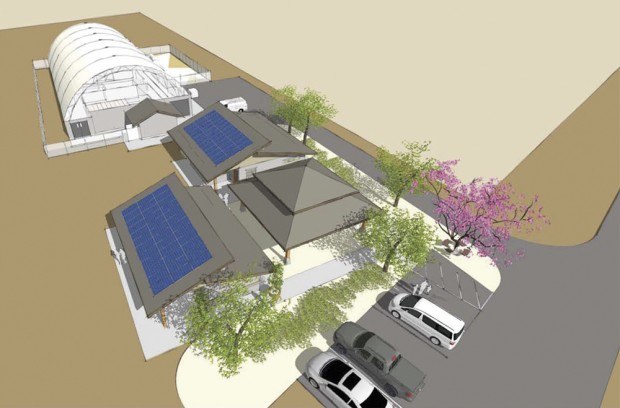LIHU‘E — Misunderstood by some, hated by few and loved by many, Hawaiian monk seals have an experienced and influential ally on the Mainland who is willing to add a milestone step in the fight against the extinction of Hawai‘i’s official state mammal.
The Marine Mammal Center, based in Sausalito, Calif., received two anonymous donations at the beginning of the year totaling $650,000, to be used toward a new Hawaiian Monk Seal Healthcare Facility in Kailua-Kona.
The entire facility is estimated at about $3.2 million, but to break ground and begin basic operations, $1.7 million is needed. Tallying all funds raised so far, the new contributions put the center $150,000 away from breaking ground at Kona’s Keahole Point.
“This will be the first facility of its kind — a hospital/rehabilitation facility devoted solely to the preservation of the Hawaiian monk seal,” said Kaua‘i Monk Seal Program project coordinator Tim Robinson. “It will host animals from both the main and northwestern Hawaiian Islands.”
A $500,000 donation at the beginning of January came from someone who had already given $250,000 to the center, according to MMC Executive Director Jeff Boehm. After hearing about it, another anonymous donor last week pledged an additional $150,000 toward the hospital.
He said the new facility in Kona has had “large and extraordinary” support from many around the country. With $1.55 million secured, the facility needs $150,000 to break ground.
“If we can secure these funds, we’re talking going through the next steps to hopefully be at groundbreaking within another four to six months,” Boehm said.
The $1.7 million to be used in the project’s first phase would be enough to fund four pools with clean water and basic infrastructure for the animals, Boehm said. Ultimately, the facility would expand to have a laboratory complex, a kitchen and a visitor center. But that would come after the center raised another $1.5 million to complete the facility as designed.
“We all are really excited,” MMC communications manager Jim Oswald said. “It’s fantastic news.”
Staff at the Sausalito center has worked closely with the National Oceanic and Atmospheric Administration for almost 12 years on monk seals’ recovery, according to Oswald.
There are about 1,100 Hawaiian monk seals left in the world. With the seal population declining annually at a rate of 4 percent, the International Union for Conservation of Nature expects there will be less than 1,000 seals by 2014.
“We have been working to help change that course of action,” Oswald said.
Northern elephant seals, he said, were once endangered and on the brink of extinction, but conservation efforts helped the species to make a comeback.
The new facility would be able to house nine to 10 seals at a time, according to Oswald. But it’s not going to be a zoo or an aquarium, only a temporary facility.
The much-larger Sausalito facility opened in 1975, and has helped approximately 17,000 marine animals, he said.
In 2010, the Sausalito center helped 998 animals, said Oswald, adding he is still tallying the 2011 numbers. Nine of those animals had gunshot wounds, 25 were entangled in ocean trash, 36 had problems related to oil pollution and 53 were victims of harassment at the beach.
“We even had a patient that had been shot with arrows,” Oswald said.
At the end of 2011, three Hawaiian monk seals were found dead on Molokai. NOAA officials said two of those seals died under “suspicious circumstances,” and the third death is still being investigated. A fourth seal was found dead on Kaua‘i earlier this month and also under “suspicious circumstances.” A group of non-profits and an anonymous donor have offered up to $30,000 as a reward for information leading to the arrest and conviction of the those responsible for the death of the seals.
“After the violent, evil depravity of the recent seal killings, it’s really wonderful to see the other side, where someone has donated so much money directed toward conserving these unique animals and our marine ecosystem,” said Robinson, who also served as Kaua‘i’s representative for the fundraising efforts.
Oswald said killing any marine mammal in the U.S. has been outlawed since 1972, even if a species is not protected under the federal Endangered Species Act.
Go to www.marinemammalcenter.org or call 415-289-7335 for more information or to donate to the Hawaiian Monk Seal Healthcare Facility.
• Léo Azambuja, staff writer, can be reached at 245-3681 (ext. 252) or lazambuja@ thegardenisland.com.





